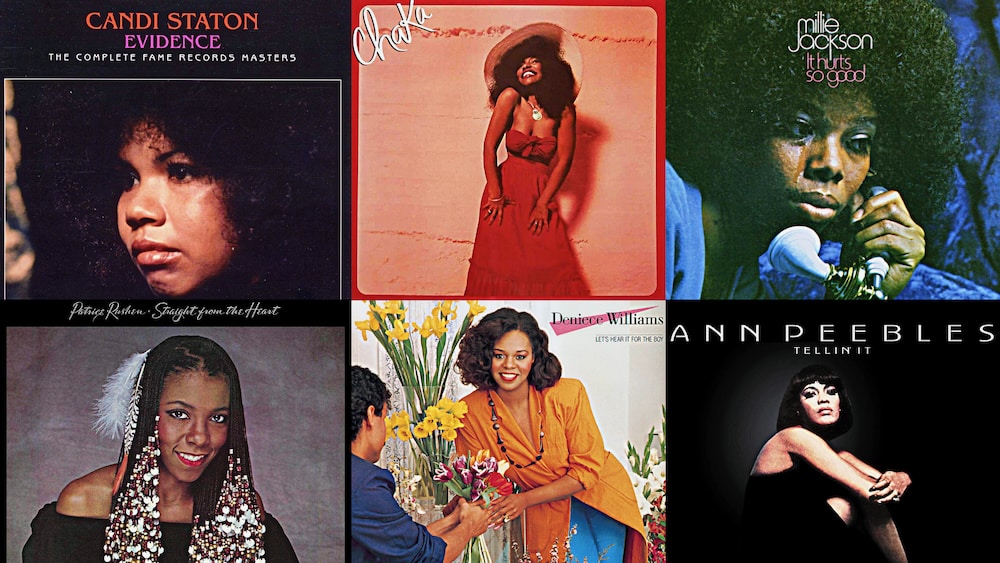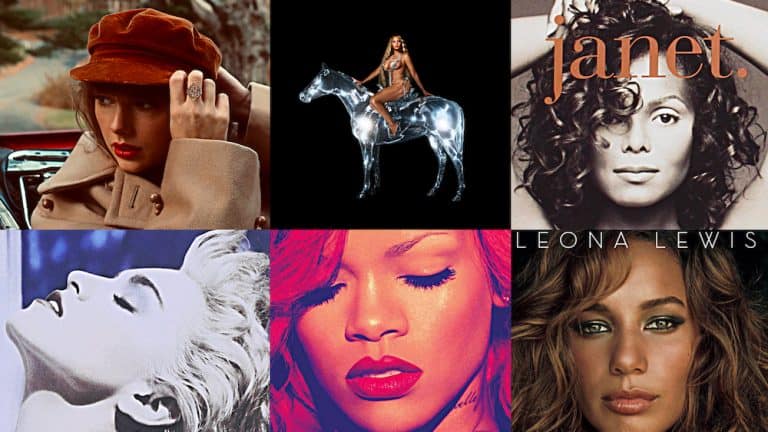15 Black Female R&B Singers of the 70s You Will Love

Black women have been pushing the R&B music genre forward for decades, with a mix of talent, hard work, and innovation. So in this article, I’m going to share my top picks for the best black female R&B singers of the 70s. Hopefully, you’ll not only enjoy these selections, but discover one or two brand new artists as well!
Best Black Female R&B Singers of the 70s
Let’s begin with Natalie Cole.
1) Natalie Cole

Natalie Cole’s debut 1975 album Inseparable spawned two number-one hits, including the ubiquitous “This Will Be (An Everlasting Love),” and two Grammys. The album showcased Cole’s vocal prowess and daring.
From the acrobatic vocal stylings of the samba “Joey” to the gut-wrenching testimony of the soulful ballad “I Can’t Say No,” to the determined sensuality of the funky “How Come You Won’t Stay Here,” Inseparable established Cole as a vocalist who was as comfortable scatting and crooning as she was growling and belting.
Cole closed out the 70s with three more gold and two platinum albums, a third Grammy and a star on the Hollywood Walk of Fame.
- You May Also Enjoy: Black Female R&B Singers of the 90s
2) Roberta Flack
Classical pianist Roberta Flack gained notice for her exquisite arrangements of folk, pop and blues songs. Flack’s subtle vocal phrasings place the lyrics at center stage, and her delivery in songs like Buffy Sainte-Marie’s “Until It’s Time for You to Go” and Janis Ian’s “Jesse” is downright heartbreaking.
Her debut single “The First Time Ever I Saw Your Face” spent six weeks at number one. Before the close of the decade, Flack had earned two more number one singles (for “Killing Me Softly with His Song” and “Feel Like Makin’ Love”) and four Grammys.
- You Also Might Like: Black Female Singers of the 70s
3) Betty Wright
Southern soul singer-songwriter Betty Wright sounded more like a middle-aged auntie and less like the 17 year-old she was when “Clean Up Woman” was released in 1971. Her full, confident voice was wise beyond its years.
Wright’s songs often doled out advice on subjects like adult love-making (“Tonight Is the Night”), adultery (“Baby Sitter”) and adulteration (“Brick Grits”). But the young woman had quite the head for business, and before the decade was out, she had released seven albums, racked up 21 singles, recorded a duet with Alice Cooper, and won a Grammy for the disco hit, “Where Is the Love.”
4) Minnie Riperton

A high, whistle register singing style might have been a shtick for a less talented singer. But for Minnie Riperton, it was just one facet of her luxuriant and masterful voice.
In 1970, the former Rotary Connection member released her cinematic, Bacharach-esque debut album Come to My Garden–the first of five albums that spanned jazz, pop, country-folk, funk and sexy R&B. Riperton’s songs–in particular, “Les Fleurs,” “Reasons,” “Lovin’ You,” “Baby This Love I Have,” Inside My Love,” “Memory Lane” and “Here We Go”–have been copiously sampled in rap and hip-hop songs.
- You Also Might Like: Black Male Singers of the 2000s
5) Millie Jackson
Concept albums were mostly a progressive rock staple in the 70s but R&B singer-songwriter Millie Jackson released two. Her 1974 release Caught Up and its 1975 sequel, Still Caught Up follow the tale of an affair from both the wife and mistress’s perspectives. Known as the Mother of Hip-Hop for her spoken word style in such songs as “The Rap” and “Logs and Thangs,” Jackson is also a formidable singer with a powerful, bluesy voice.
Part stand-up comedian, part performance artist, Jackson released an impressive 12 albums in the 70s that covered country, disco and everything in between. Raunchy, straightforward and unapologetic, Millie Jackson is a torchbearer of female sexual liberation.
6) Syreeta
Pittsburgh-native Syreeta Wright’s impact on 70s R&B music is immeasurable, largely due to the number of songs she composed with one-time husband Stevie Wonder. Following their first collaboration on “It’s a Shame” by The Spinners, Wright and Wonder went on to pen some of Wonder’s biggest hits of the early 70s (“If You Really Love Me,” “Signed, Sealed, Delivered (I’m Yours),”) as well as write songs for Smokey Robinson & The Miracles.
Wright released five albums in the 70s, each showcasing the sublime delicacy of her singing voice. Her powerhouse performance of raw emotion on The Beatles’ “She’s Leaving Home” turns the song into more of a tearjerker than it ever was intended to be.
- You Also Might Like: Black Male Singers of the 90s
7) Ann Peebles
When you hear the electric timbale mimicking the sound of raindrops, you know you’re in for a sonic treat. But long before Ann Peebles released “I Can’t Stand the Rain,” a song John Lennon referred to as “the best song ever,” the singer had been making waves in the R&B world.
Her debut album in 1969, This Is Ann Peebles, produced the hits “Give Me Some Credit” and “Walk Away”. Peebles followed these up with “Part Time Love,” “Breaking Up Somebody’s Home” and “I’m Gonna Tear Your Playhouse Down”. The gritty, soulful and sassy singer released six albums in the 70s, amassing seven chart-topping hits and two Grammy nominations.
8) Táta Vega
A decade before she breathed life into Shug Avery, the Queen of Disco Gospel Táta Vega released her debut albumon Motown’s Tamla label. While Full Speed Ahead and her sophomore effort, Totally Táta introduced audiences to the jaw-dropping versatility of this vocal chameleon, the albums failed to gain traction.
Even Vega’s incredible syncopation on “Come in Heaven (Earth Is Calling),” a soulful ballad that morphs into a smoking disco track, could’t break through the charts. It was 1978’s Try My Love that eventually struck gold, with the single “Get It Up for Love” earning Vega a UK disco hit.
- You Also Might Like: Black Male Singers of the 70s
9) Candi Staton
First Lady of Southern Soul Candi Staton surfed the changing tides of the 70s like a pro. Her first big hit of the decade was a version of the country song “Stand By Your Man,” but she closed out the 70s with a string of disco hits.
Staton’s raw, determined voice sang about women who were “too proud to break down and cry”. Her biggest hit, 1976’s liberation anthem “Young Hearts Run Free,” reflects Staton’s own experience with abusive relationships, and was recorded in one take. According to the singer, “The hurt in my voice is real. I was singing my life.”
10) Esther Phillips
Esther Phillips is an anomaly in this list. She topped the R&B charts in the 1950s and 60s but it was in the 1970s that her light really began to shine. Phillips released 14 albums during the decade, and received three Grammy nominations–a testament to her skill of interpretation.
Phillips oozed her truly original, sometimes bizarre, voice onto songs like “How Blue Can You Get” and “What a Diff’rence a Day Makes” and turned them into classics of her own. With Esther Phillips, seeing is believing, and readers unfamiliar with Phillips’s sound would do well to watch her performances on the November 8, 1975 episode of “Saturday Night Live.”
11) Donna Summer

Queen of Disco Donna Summer burst onto the scene with “Love to Love You Baby” in 1975. Her collaboration with composer Giorgio Moroder produced some of the most memorable dance hits of the era, including “I Feel Love” and “Hot Stuff”. Summer’s sultry, dynamic vocals helped define the disco sound, and a string of awards were the result.
Summer had some success with ballads (“Winter Melody”) but the four-to-the-floor formula proved her strength. Her reworking of Jimmy Webb’s “MacArthur Park” showed how even a gloomy, orchestral pop song became a dance floor sensation in Summer’s capable hands.
12) Alice Clark
Alice Clark’s self-titled, debut album went unnoticed when it was released in 1972. However, in the 50 years since, the album and singer have attained cult status. Alice Clark illustrates Clark’s precision of vocal emotion, and is full of gems like the impeccably arranged “Never Did I Stop Loving You.”
After the album flopped, Clark retired from the music industry. It is high time Clark took her rightful place among the greatest R&B singers of all time.
13) Deniece Williams
By the time Deniece Williams released her debut album This Is Niecy in 1976, her vocal credits included appearances on songs by Syreeta Wright, Minnie Riperton, Roberta Flack and Candi Staton.
On her first hit “Free”–a pristine celebration of R&B music of the 70s–the songbird shocked the world with her four-octave range. “Too Much, Too Little, Too Late,” her 1978 duet with Johnny Mathis, went to number one on the pop, R&B and adult contemporary charts.
14) Patrice Rushen
Composer and pianist Patrice Rushen had three jazz albums under her belt before releasing signing with Elektra in 1978. “Haven’t You Heard” from 1979’s Pizzazz topped the dance and R&B charts, propelling Rushen to stardom.
The powerhouse dance production establishes the song as a pre-cursor to house music. “Haven’t You Heard” is considered by Rolling Stone Australia to be one of the top 200 dance songs of all time.
15) Chaka Khan

Undeniably the biggest female singing sensation to emerge from the 1970s R&B scene is Chaka Khan. Khan sings like a marathon runner: she never runs out of stamina. Khan led the funk group Rufus to four number one singles and a Grammy for “Tell Me Something Good”.
In 1978, she also earned a Grammy nomination for her debut solo single “I’m Every Woman”. The end of the 70s also saw Khan collaborate with Quincy Jones and slide guitarist Ry Cooder. Gifted with a rich voice in any octave, Khan is considered one of the greatest vocalists of all time.
Conclusion
It’s impossible to deny how impactful black female R&B singers of the 70s were. Not only did they make great music that stands the test of time, but they also paved the way for the likes of Whitney Houston and Mariah Carey, as well as Brandy and Monica to follow in their footsteps towards success.
If you enjoyed the article, be sure to subscribe to my Devoted to Vinyl YouTube channel and Facebook page.





